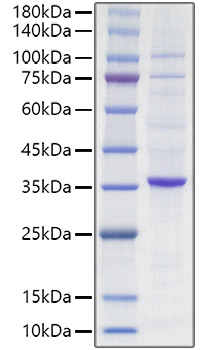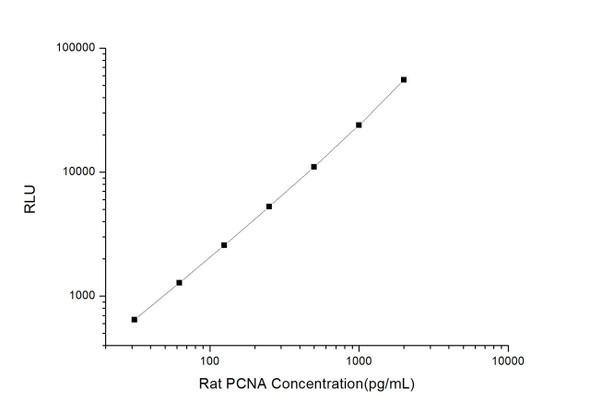Description
Recombinant Human Proliferating cell nuclear antigen/PCNA Protein
The Recombinant Human Proliferating cell nuclear antigen/PCNA Protein is a biologically active recombinant protein that plays a significant role in various cellular processes and signaling pathways in human biology. This protein is widely employed in immunological research, cell biology studies, protein-protein interaction analyses, and therapeutic development, providing researchers with a reliable tool for investigating Proliferating cell nuclear antigen/PCNA function and its implications in health and disease.
This product (SKU: RPCB1784) is produced using HEK293 cells and features a N-HA&Strep tag for convenient detection and purification. The protein exhibits a calculated molecular weight of 29.74 kDa with an observed molecular weight of 35 kDa under denaturing conditions, achieving ≥ 90 % as determined by SDS-PAGE., ensuring exceptional quality and consistency for research applications.
Key Features
| High Purity by Affinity Chromatography | |
| Mammalian & Bacterial Expression Systems | |
| High lot-to-lot consistency via strict QC |
| Product Name: | Recombinant Human Proliferating cell nuclear antigen/PCNA Protein |
| SKU: | RPCB1784 |
| Size: | 10 μg , 20 μg , 50 μg , 100 μg |
| Reactivity: | Human |
| Synonyms: | ATLD2;Proliferating cell nuclear antigen;PCNA |
| Tag: | N-HA&Strep |
| Expression Host: | HEK293 cells |
| Calculated MW: | 29.74 kDa |
| Observed MW: | 35 kDa |
| Gene ID: | 5111 |
| Protein Description: | High quality, high purity and low endotoxin recombinant Recombinant Human Proliferating cell nuclear antigen/PCNA Protein (RPCB1784), tested reactivity in HEK293 cells and has been validated in SDS-PAGE.100% guaranteed. |
| Endotoxin: | < 0.1 EU/μg of the protein by LAL method. |
| Purity: | ≥ 90 % as determined by SDS-PAGE. |
| Formulation: | Lyophilized from a 0.22 μm filtered solution of PBS, pH 7.4. |
| Reconstitution: | Centrifuge the vial before opening. Reconstitute to a concentration of 0.1-0.5 mg/mL in sterile distilled water. Avoid vortex or vigorously pipetting the protein. For long term storage, it is recommended to add a carrier protein or stablizer (e.g. 0.1% BSA, 5% HSA, 10% FBS or 5% Trehalose), and aliquot the reconstituted protein solution to minimize free-thaw cycles. |
| Storage: | Store at -20℃.Store the lyophilized protein at -20℃ to -80 ℃ up to 1 year from the date of receipt. After reconstitution, the protein solution is stable at -20℃ for 3 months, at 2-8℃ for up to 1 week. |
Proliferating Cell Nuclear Antigen (PCNA) is a protein only expressed in normal proliferate cells and cancer cells. It is central to both DNA replication and repair. One of the well-established functions for PCNA is its role as the processivity factor for DNA polymerase delta and epsilon. PCNA tethers the polymerase catalytic unit to the DNA template for rapid and processive DNA synthesis. Two forms of PCNA exist in cells: (i) a detergent-insoluble trimeric form stably associated with the replicating forks during S phase and (ii) a soluble form in quiescent cells in G1 and G2 phases. PCNA forms a toroidal trimer in S phase with replication factor-C (RF-C) and DNA in an ATP-dependent manner and enables the loading of DNA polymerase delta and epsilon onto the complex. The close association of PCNA with kinase complexes involved in cell cycle machinery indicates that PCNA has a regulatory role in cell cycle progression. PCNA also participates in the processing of branched intermediates that arise during the lagging strand DNA synthesis.







